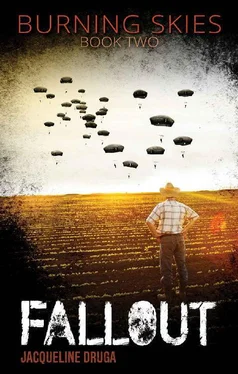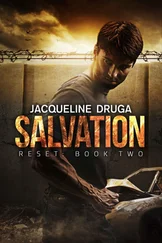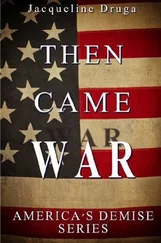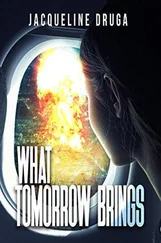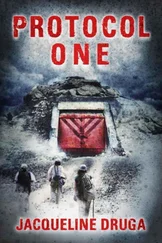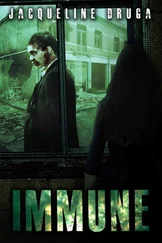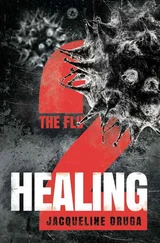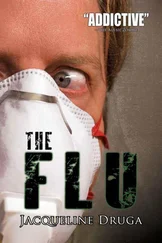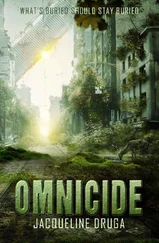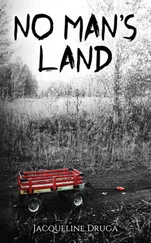Before Cal even arrived at Caldwell, he saw the road block. Cars were lined up leading to it. All of them were empty and abandoned. At the end of the line of cars was a fence and he could make out several large military vehicles.
“Our inside man is not in a position of trust, he will reach out to you, he will give you the means to communicate.”
“How will I know him?”
“He’ll come to you. You know what we need.”
Cal couldn’t believe he’d agreed to do it, but what else did he have to do? Louise would have wanted him to and probably would have scolded him if he refused.
His instructions swirled in his mind, he was given so much direction and so little time.
He was tired. He was far from a hundred percent and hoped to rest but knew that was impossible. He heard it about the same time he saw it.
Weapons being engaged, and words shouted out to him in a language he didn’t understand.
Cal had arrived at the check point and did the only thing he could. He raised his arms in surrender.
“I just want to go home, can you guys help me get home and out of this Godforsaken place?” Cal tried to convey to the soldiers but was treated like a wanted fugitive.
He was roughly pulled aside, his items taken and searched. He was patted down for weapons, but they did take interest when they discovered his passport.
They returned his backpack and walked him through the security fence. A block into the walk on the right was a gas station, one of those convenience store types. There was a gas tanker there and it looked as if they were taking the gas.
Cal took in everything, just as asked. The entrance off of Highway 77 was barely guarded, he guessed that was because of the sea of cars parked across all six lanes of the road.
Soldiers mulled around, and there didn’t appear to be any civilians. Clearly, that area was for military only.
After passing the gas station, Cal was brought into a large box-style tent. Inside, decorated military personnel spoke to each other and gathered around a large table. They paid no mind to his presence. The soldier that escorted Cal inside held up his hand to Cal, signaling for him to stay put.
Cal stopped walking and watched the soldier walk over to one of the leaders. He presented the leader with Cal’s passport, then the gentleman nodded and walked toward Cal.
He held out his hand to a table and chairs and Cal sat.
Cal wasn’t familiar with Chinese army rank but could guess by the stack of upside down Vs on the patch on his arm, the man was a sergeant.
The sergeant spoke slowly and with pronounced and slightly broken English.
“You are in America. Why?”
“Vacation,” Cal replied. “I want to go home.”
“I see. Home. London?” he asked.
“Yes. Is that possible? Is there a way for you to help me get home? I’ll do what I need to do until then.”
“I will make some calls,” he said, lifting the passport. “I will need to hold on to this.”
“Yes. Absolutely.”
“Mister… Calhoun, is it?”
Cal nodded.
“It could be some time. You would be willing to work the camp as an ambassador? We need English-speaking workers.”
“Yes, I will.”
“You do not look healthy.”
Cal shook his head. “I have been sick. Radiation.”
“We will see about getting you a job and bed, until then let us get you medical treatment. Follow me.” He walked by Cal and out of the tent. Cal followed.
He didn’t know what the job and bed would entail, but he did know one thing, he was in and that was reason for his being there.
USNORTHCOM, Colorado Springs, CO
Welch had to wait twenty-four hours before he could leave the mountain and investigate.
The raging battle, continuous gunfire over what Welch called ‘the flag’ had ended. One call out, and the rescue came in the form of an experimental bomb from Russia.
It was so different that even masks didn’t work. Welch lost three men. Men who believed they were safer and stayed outside to keep firing.
The bomb was not an explosion, it didn’t contain fire power, radiation, or some biological agent. Instead, when the bomb detonated it spewed trillions of what Welch could only describe as microscopic shards of glass or similar to glass.
If any landed on the skin, they were absorbed and like acid ate their way through the layers of epithelia. But their main route of attack was inhalation and that caused an agonizing death.
The microscopic shards entered the person’s airways, embedding in the lining of the bronchial tube and lungs. Every breath taken thereafter, pushed the shards deep into the tissue, cutting it to shreds.
The victim coughed and choked as the entire respiratory system was annihilated, the lining of the lungs turned into a slosh and they drowned in their own blood.
It was horrendous and painful.
It was… inhumane, but the only way to bring a halt to the situation outside of Cheyenne mountain. He supposed another wave would come, and he was confident that they wouldn’t detonate a nuclear weapon, at least not yet. Not when they needed access to the United States Arsenal. It was the only control hub left. Welch made sure of it.
Until that time came when they’d retreat inside after another attack, Welch made his way outside to assess.
Twenty-four hours after they had wiped out the thousands of Chinese soldiers, no retaliation had occurred. No one from the Procs showed up. That told Welch they weren’t in constant contact. The invasion was too big, there weren’t enough hands on the battles to manage it properly. Things… soldiers… battalions slipped through the cracks. As did those who lost their lives at the massacre at Cheyenne.
Outside, General Welch wore covering over his entire body as a safeguard. The fence outside the compound was down, not that it did much anyway. The main tunnel entrance had been battered, and starting from the second he walked outside, Welch saw bodies.
They didn’t just drop where they were. They died in various positions, holding onto their throats, bent over with piles of dried blood by them. Some were curled up and others even appeared as if they were crawling. Fingers scraping the ground, mouths wide open, probably screaming in agony.
Thousands of bodies scattered about.
It was quiet, and the battle had been won.
Welch wanted to feel bad, but he couldn’t. Those thousands of lives lost paled in comparison to the millions of Americans who were now dead because of them.
The massacre at Cheyenne was not only the end of one page, but it was something else. Something bigger.
It was the opening of the starting gate.
General Welch put out word that it was time.
A call to arms to those ready to fight, the rise of the resistance and the beginning of what would be the biggest war America would ever face… Operation Recover Home.
Sixteen Days Post Bombs
Mitton, TX
Perfect.
Fen couldn’t ask for more perfection. It was exactly what they needed. The small town of Mitton was clean and picturesque. The townspeople moved about happily as instructed and there wasn’t a single case of sickness.
Fen directed everything like a movie producer, knew what went where and how it should look.
Four photographers and videographers were present and she pointed to where and what they would photograph. An Asian news correspondent stood by, preparing for a broadcast.
“Play with the children,” Fen instructed a group of soldiers. “Smile, laugh.”
She pointed to the camera people to capture the group of people having coffee at an outdoor café, and those who laughed while in line to get provisions.
Читать дальше
